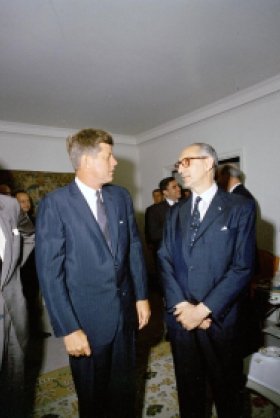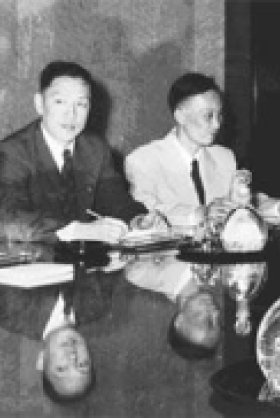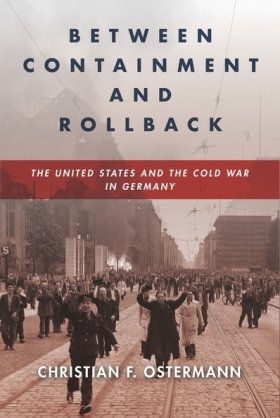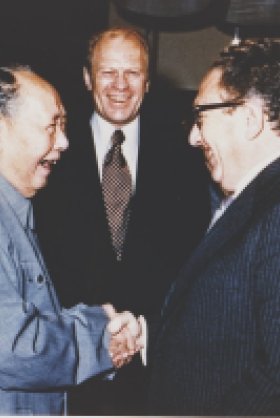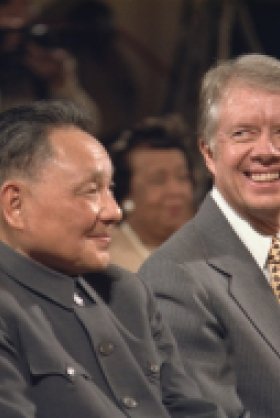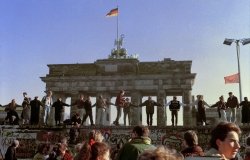Is the Cold War Finally Ending in Korea? Opinions of Two Experts
 To the American way of thinking, the Korean War was a more satisfying involvement -- because the cause was just -- than Vietnam proved a decade later. Tellingly, the long-running television series M*A*S*H, though set in Korea during the Korean War, was targeted at U.S. policy in Vietnam.
To the American way of thinking, the Korean War was a more satisfying involvement -- because the cause was just -- than Vietnam proved a decade later. Tellingly, the long-running television series M*A*S*H, though set in Korea during the Korean War, was targeted at U.S. policy in Vietnam.
But even a just war presents its own challenges, not least of which is becoming disengaged when the fighting finally stops. Half a century since the ending of the Korean War, the United States continues to be involved, both militarily and economically, in the Korean peninsula. Even the ending of the Cold War did not change these dynamics because technically the Republic of Korea (ROK) and the Democratic People's Republic of Korea (DPRK) are still at war, having signed an armistice but not a peace agreement. Further exacerbating the situation is the unpredictability of North Korea, which until recently was ruled by the one remaining Stalinist despot, Kim Il Sung.
Against this background, the June summit that took place between South and North Korean presidents presented the United States with several looming issues. If President Kim succeeds in drawing North Korea out of its Stalinist shell, what effect will this have on U.S. economic interests in South Korea? Just if not more importantly, what are the implications for U.S. security -- what happens to the 37,000 U.S. troops stationed in South Korea?
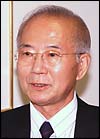 Mary-Lea Cox and Tim DiIorio of the Center's Web office recently interviewed two Korea experts, John Oh from Catholic University and Scott Snyder of the Asia Foundation's Korean office, for their views on where the two Koreas seem to be headed in the wake of the historic summit between their leaders.
Mary-Lea Cox and Tim DiIorio of the Center's Web office recently interviewed two Korea experts, John Oh from Catholic University and Scott Snyder of the Asia Foundation's Korean office, for their views on where the two Koreas seem to be headed in the wake of the historic summit between their leaders.  Snyder and Oh are both specialists in the affairs of Korea and yet are mirror opposites: Snyder is an American based in Seoul, while Oh is a Korean who lives and works in Washington.
Snyder and Oh are both specialists in the affairs of Korea and yet are mirror opposites: Snyder is an American based in Seoul, while Oh is a Korean who lives and works in Washington.
We want to talk to you about the historic summit meeting on June 13-15 between South Korean President Kim Dae Jung and North Korean President Kim Jong Il, aimed at easing hostilities on the divided Korean peninsula. As a result, each country will send 100 separated family members to the other side this month for reunions with relatives they haven't seen since the Korean War. Why did such a rapprochement occur at this moment? Does it have anything to do with the 50th anniversary of the ending of the Korean War?
JOHN OH: "Why now?" is an important question. I believe it is because Kim Dae Jung is the president of South Korea. He has been pondering the question of reunification longer than anyone I know and has even written a sizeable volume on three-stage reunification of Korea that specifies the methodologies for each of the three stages.
An indomitable force in Korean politics for some thirty years, Kim Dae Jung is secure in his position after two and a half years as president. The government of South Korea is stable, the economy is relatively prosperous, and the society is generally stable. This may be the reason why on the 50th anniversary of the ending of the Korean War, President Kim decided he was ready to talk with the North Koreans.
On the other hand, Kim Jong Il has been in power in North Korea since his father's death in 1994. He has been consolidating his power for the past several years, and it seems he has the solid backing of the North Korean military, although the country's economy is a basket case. However, due to South Korean assistance led largely by Kim Dae Jung -- as well as economic and humanitarian aid from other countries -- the economy of North Korea has not collapsed. There is a theory of the "hard landing" of the North Korean economy, but it hasn't occurred.
Even so, Kim Jong Il must have realized that the status quo is not the answer. Then came the overture from the confident South Korean president advocating a "sunshine policy" of political, economic, and humanitarian engagement. I believe the two leaders met this June by mutual agreement.
It's a small beginning. One of the first concrete steps will be allowing visits by long-separated families. Some calculate there are as many as 1.8 million families who have been separated for fifty years now. Many of them are old and dying. Initially, just 100 persons from each side will be reunited for a few days. This is just a drop in the bucket considering how many more families are in this situation. But I see it as a symbolic beginning and am hopeful it will lead to the two countries tackling larger, more significant issues. Reuniting families is a humanitarian gesture -- an easier place to begin.
SCOTT SNYDER: The recent summit between Kim Dae Jung and Kim Jong Il has opened the way for a broader interaction, exchange, and dialogue between the two Koreas. There were a number of false starts during the past few decades, since the re-opening of a dialogue between the two Koreas in 1972. However, all past efforts ended in stalemate or failure because of the history of mistrust resulting from the Korean War. Now we are further away from the emotions of the Korean War -- but not so far away that those directly affected by the war have forgotten it. If anything, the 50th anniversary of the Korean War reminds us that the scars left by the war have yet to be healed.
I agree with Professor Oh that we can attribute the progress we saw in June to two primary factors: first, Kim Dae Jung's policy of reconciliation toward North Korea, known as the Sunshine Policy; second, the apparent consolidation of political power under Kim Jong Il that allowed him to respond positively to Kim Dae Jung's initiative.
I suspect that Kim Jong Il wants his people to perceive him as capable of overcoming North Korea's disastrous famine and economic stagnation -- but he can't pursue a reform agenda that would disown the work of his father, the founder of the DPRK, Kim Il Sung. This gives him little choice but to reach out politically to the outside world; and of course the key actor in any rehabilitation of the North Korean economy must be South Korea. The South is the only country that can provide the North Koreans with large-scale aid.
Plus it must be easier for Kim Jong Il to pursue rapprochement with Kim Dae Jung, who has been consistently open to efforts to rehabilitate North Korea's economy and establish a new political era of exchange and cooperation in inter-Korean relations.
In your view, is reunification of the two Koreas imminent, or could things go badly wrong? Against the background of recent events, can you speculate a likely scenario in the months to come? If reunification occurs, will it indeed be a "soft landing"?
OH: I do not expect reunification to happen overnight or over a few or several years, but I'm sure it will come eventually. Prior to the division in August 1945, Korea managed to hold together as a unified, homogeneous entity for at least 1,300 years, some claim as many as 4,300. When you consider fifty odd years against this background, it is insignificant.
On the other hand, a major ideological and political division has been present during these past fifty years. A couple of million Koreans died in the Korean War, leaving deep scars. Different systems have existed on both sides for half a century, and it will be a challenge to achieve a functioning unification of politics, economy, the military, and all other aspects related to division. So how long it will take to go through a stage of confederation, formal federation, and finally reunified government is anyone's guess. I would be pleased to see it happen in my lifetime.
Even when some people were talking about a "crash landing," I was not expecting it. The system in North Korea is capable of sustaining a great deal of "pain" that open democratic systems would find intolerable. North Korea is a completely closed society. What they've got is all they know. As long as the military remains loyal to Kim Jong Il, the system could last almost indefinitely.
What is more, South Koreans don't want to see a crash landing because of how much it would cost to absorb a completely collapsed state. North Korea is now a failing state, but indications are it will not collapse before a form of reunification, or meaningful approach to that outcome, occurs.
SNYDER: The June 15 Joint Declaration between the leaders of the two Koreas shows that neither side is contemplating imminent reunification. In fact, the declaration affirms the need to maintain two political systems for the foreseeable future while enhancing political cooperation. In so doing, it underlines the importance of gradual reintegration as a necessary feature of any reintegration process.
Korea would do well to take a leaf out of Germany's book. While the pace of German reunification was both unanticipated and uncontrollable, the process was peaceful -- something Korea should strive to replicate. In any case, given the current political climate in the two Koreas, I think it unlikely that Korean reunification will occur rapidly.
But with Korea, one never knows -- that's what makes it such an interesting place to study. The inter-Korean reconciliation process is still sufficiently immature, and the DPRK's economic distress sufficiently serious, that no scenario can be entirely ruled out.
Could you describe the reaction of the Korean people to the recent easing of tensions? We don't hear much about Korean attitudes in the United States.
OH: People in South Korea and many Koreans in the United States were riveted to their TVs throughout the summit meeting. North Korean coverage was not as extensive, though the summit was reported through the country's controlled TV channels and radio. I know that pictures of handshakes, welcoming and farewell gestures at the airport, scenes of toasting and the like, made the North Korean front pages. So North Koreans are at least aware of what's been happening. This is a departure from the North Korean policy of imposing a complete blackout on news concerning rapprochement with the "running dogs of imperialism."
I was also interested to see that the Chinese gave extensive news coverage, as did the Russians and Japanese. The Orwellian state of North Korea is not so tightly closed any more.
"Our Longing is Unification" is a popular song in Korea. South Koreans have been singing it for decades. Significantly, Kim Dae Jung and his wife, as well as Kim Jong Il and his advisors, sang the song during the summit meeting. I noticed tears in one person's eyes -- the person wasn't identified, but I could understand his sentiments. The scene was highly emotional.
But we shouldn't overestimate the effects of this emotional display. The cold calculation of what this will cost South Korea is checking sentimentality. The burden to be borne by South Koreans will be much worse than experienced by the West Germans. North Korea is a near-failed state. Pouring 24 million people who are bankrupt into a nation of 47 million -- it's a population ratio of 2 to 1, but with South Koreans at thirty times the income level of North Koreans -- will obviously be a major burden that no South Korean calculating the cost effectiveness of this would welcome.
SNYDER: On the ground in Seoul, I witnessed firsthand the reactions to the summit, and as Professor Oh says, it was a very emotional experience for most Koreans. Many here in the South just could not get over the idea of their president traveling to Pyongyang and shaking hands with his counterpart in a dramatic airport greeting. Such an event was unthinkable even a little over two months prior to the summit. Imagine two family members who haven't spoken kindly to each other in decades suddenly coming to the family Thanksgiving dinner, shaking hands, and remaining civil to each other, all the way through dessert. The impact of the summit for Koreans was like that -- watching the unimaginable become reality.
Since then, Koreans have started believing in the possibility of solving all other problems related to Korea's division -- if only the two sides could join hands and work together. So the handshake between the two leaders was a powerful psychological symbol of reconciliation, even if the practical problems associated with improving relations between the two Koreas have yet to be tackled.
We are interested in discussing the latest events on the Korean peninsula in light of your respective areas of expertise. Professor Oh, you are the author of several books on the emergence of South Korea as a democratic republic, and this 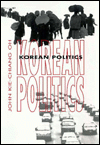 afternoon you'll be delivering a paper at the Wilson Center on the populist origins of South Korean democracy, particularly as related to Kim Dae Jung's presidency. Could you tell us, will South Korean democracy be compromised by reunification -- would the South concede some of its political principles in order to reunite with the North?
afternoon you'll be delivering a paper at the Wilson Center on the populist origins of South Korean democracy, particularly as related to Kim Dae Jung's presidency. Could you tell us, will South Korean democracy be compromised by reunification -- would the South concede some of its political principles in order to reunite with the North?
 And Mr. Snyder, you recently published a book on North Korean negotiating behavior. In your view, can Kim Dae Jung's negotiating style -- his sunshine strategy -- succeed ultimately? He has been facing mounting criticism at home and abroad, especially in the American Congress, from those who say his policy of engagement with North Korea is naÔve and ineffective. These critics call for a harder-line stance toward North Korea; do you agree?
And Mr. Snyder, you recently published a book on North Korean negotiating behavior. In your view, can Kim Dae Jung's negotiating style -- his sunshine strategy -- succeed ultimately? He has been facing mounting criticism at home and abroad, especially in the American Congress, from those who say his policy of engagement with North Korea is naÔve and ineffective. These critics call for a harder-line stance toward North Korea; do you agree?
OH: South Korean people -- intellectuals, religious leaders, opinion leaders, and now President Kim Dae Jung's government -- are firmly committed to democratic principles as they apply to the realities of Korea. To sacrifice or compromise these principles on behalf of reunification with a Stalinist regime -- one of the two remaining in the world, maybe the worst ever seen -- would be unacceptable to South Korean leaders.
So a confederation, while maintaining separate systems, may be the best compromise approach. And after some time, we could consider a federation arrangement. Still, a unified government would have to be a democratic government, I believe.
SNYDER: Kim Dae Jung's approach to North Korea abandons the zero-sum approach of past South Korean administrations on the premise that it is possible for both sides to make gains in dealing with each other. Kim Jong Il appears to have accepted this "win win" approach, but it is necessary to see substantive, concrete progress between the two Koreas before we can judge if North Korea is responding in kind to Kim Dae Jung's initiatives.
The fact that both leaders now depend on each other politically -- and that they have identified a mutual economic interest in rehabilitating North Korea's economy through investment in "social overhead capital," or the rebuilding of North Korea's railroads, highways, and ports -- offers an opportunity for both sides to pursue cooperative ventures that could eventually lead to a changed political environment. However, we need more time to observe whether the current process actually takes root.
Even though the United States, China, and Japan would officially welcome the uniting of the two Koreas (especially if it happens as a soft landing), it's our impression that strategically, the leaders in these countries might actually prefer keeping the two Koreas apart. How do leaders -- particularly in the United States, China, and Japan -- interpret these developments? What are the long-term implications of reunification for East Asian security?
OH: You did not mention Russia, but Russia is a player as well. Whether the Russians would welcome a unified country that is closely allied with the United States and Japan remains a question.
The Chinese have been the principle supporter of the North Koreans in recent decades. Still, China shares a border with Korea and for that reason would prefer a stable Korean peninsula, which cannot be said of the current situation. But whether China is eager for a reunified Korea closely allied with United States and Japan also remains a question.
Japan in dealing with the two Koreas realizes that a unified Korea would be about the size of Germany or France, with a highly trained population and one of the highest literacy rates in the world, as well as a disciplined workforce. I don't know whether the Japanese are truly eager for a unified Korea with the potential to become a France or Germany. This, I believe, would be a difficult question for them. Still, Japan would prefer a peaceable, stable Korea to the current situation where North Korea is capable of threatening its physical safety with intercontinental ballistic missiles.
In principle, the United States is all for peaceful reunification, and the U.S. government is in favor of removing the military threat emanating from North Korea. At the same time -- and I don't wish to overemphasize this -- North Korea is a convenient "rogue" state that some powerful circles in the United States appear to need.
Take a look at the controversy surrounding the so-called Star Wars Strategic Defense Initiative. North Korea was branded a threat to the United States, which is a far-fetched notion objectively speaking. But certain large U.S. government agencies and powerful interests stand to benefit from having a visible adversary. North Korea has not been an adversary of the United States and could not be -- but it came in handy for these groups to categorize it in that way. They point to Kim Il Sung's past behavior and his son Kim Jong Il's current behavior to justify their position.
Meanwhile, responsible American sources have adopted an official position in favor of a unified, stable Korea -- as long as the United States can maintain some form of military presence in East Asia even after reunification, for the sake of regional stability. Inevitably, nationalistic sentiments throughout East Asia tend to favor the disengagement of U.S. military forces. But more rational voices in East Asia -- including President Kim Dae Jung -- support the official U.S. position. Kim Dae Jung and President Clinton are both committed to sustaining the U.S. military presence in East Asia.
SNYDER: The inter-Korean summit has put the Korean peninsula at center stage in shaping regional security developments. For the first time, Korea is in the driving seat, taking steps to shape its regional security environment rather than serving as a pawn for larger powers -- Russia, Japan, the PRC, or the United States -- to manipulate. Each of the major powers is reassessing its options in light of recent events on the Korean peninsula.
It's worth noting that Kim Jong Il has met with Jiang Zemin (secretly) and with Vladimir Putin as part of the initial phase of his "coming out" into the full view of the outside world. All three leaders criticized U.S. plans to deploy a national missile defense program.
It's conceivable that conflicts between or among the major powers with stakes in the region could hamper the Korean reconciliation process, or that the major powers could come into conflict over their respective influence on the Korean peninsula. But for the time being, I predict that the major powers will remain reactive, watching and waiting as the two Koreas fashion their own diplomacy.
Related Program

Cold War International History Project
The Cold War International History Project supports the full and prompt release of historical materials by governments on all sides of the Cold War. Through an award winning Digital Archive, the Project allows scholars, journalists, students, and the interested public to reassess the Cold War and its many contemporary legacies. It is part of the Wilson Center's History and Public Policy Program. Read more
